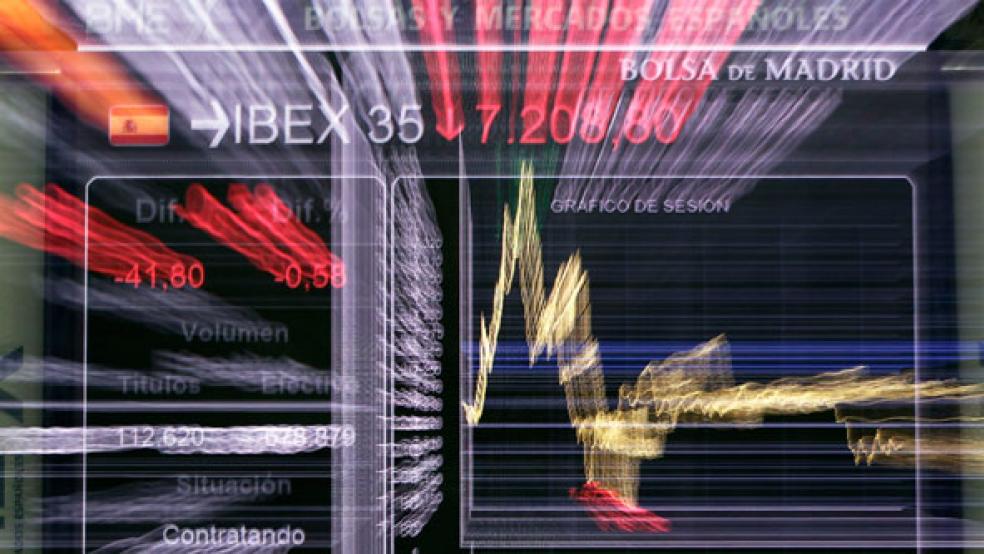Spain today managed to successfully auction more than €2.5 billion in bonds – but the “success” of such bond auctions is measured on a relative scale these days. While the Spanish government managed to sell more than it had originally planned, the average yield for the 10-year bonds came in at 5.74 percent, up from 5.40 percent in January, the last such auction.
That’s a sign investors are still worried about Spain’s ability to resolve its debt crunch at a time when austerity budgets are also undermining economic growth. And the market reaction today is a sign that, although the Eurozone’s woes are taking a back seat in the financial news cycle to corporate earnings releases, they are very present in the minds of professional investors and economists. In the forefront of it all, in the place that Greece once occupied, is Spain. Once, the country created one out of every three new jobs in the Eurozone; today, it has the region’s highest unemployment rate, beating out Greece for that dubious honor by less than a percentage point. As of mid-February, the country had absorbed some €170 billion worth of lending support from the European Central Bank – but now the question remains whether that will be enough or whether more must follow.
Spain’s Tesoro Publico – its Treasury Department – did better than expected when it auctioned off short-term notes and bills on Tuesday; the relief was one reason the U.S. stock market posted one of its biggest gains in recent weeks the same day. But before 24 hours had elapsed, worry once again returned to dominate the market. Yesterday, Spanish stock prices plunged nearly 4 percent amid anxiety over the bond auction, which was seen as a bigger and more significant test of both investors’ appetites for risk and their belief that Spain will manage to resolve its massive fiscal problems.
But while today’s auction was greeted with solid demand from investors, it wasn’t enough to allay lingering fears. That would be a tall order. Spain has slipped back into a recession, and economists view the government’s forecast that its GDP will decline 1.7 percent this year as excessively optimistic. Half of those Spaniards under the age of 25 are unemployed. While Spanish government debt doesn’t look as threatening as that of, say, Italy, the country’s private sector and its banks are overwhelmed with debt. Fears mount that, like Ireland, the Spanish government will end up stepping in to prevent the collapse of its financial sector and deliver a deathblow to its own finances in the process.
Reflecting that anxiety, yields on Spain’s government bonds keep creeping upward. Today, they are hovering just beneath 6 percent and could go higher still if bond market vigilantes lose faith in the Spanish government’s pledge to deliver on an austerity budget that includes some €446.6 billion in spending cuts.
At some point, the bond markets will simply no longer be available to the Spanish government – which already has shifted to raising capital for its 2012 budget in smaller, bite-sized auctions – and Europe’s policymakers will once again be staring at the devil’s dilemma: Another bailout coupled with a de facto default by Spain, or a real default, followed by the collapse of the Euro.
Will Germany and the Bundesbank be willing to prop up one tottery Eurozone economy after another? And how long can even the strong man of Europe keep doing that? Because right behind Spain stands Italy, a country that has also been kept alive of late thanks to frequent ECB support delivered in various ways.
We’re witnessing the downside of globalization. If one of the troubled Spanish banks teeters on the brink of bankruptcy, the ripples from these events will reach our shores in the United States as rapidly as the tsunami waves created by an underwater earthquake travel across oceans. And the financial devastation that follows will be severe. Without European consumers, companies worldwide will see their growth rates decline. The threat of contagion is real, and even if companies continue to report better-than-expected earnings for the first quarter, any deterioration in Europe’s economic stability will rapidly show up in the guidance they provide about the future.
The rain in Spain is falling, and the only question that remains is whether it’s simply a shower which will blow over or a sign of a hurricane taking shape that will wreak havoc on the global economy.






